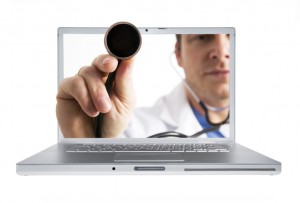Round the Clock Healthcare — for Free?
When I go on a long bike ride, I usually wear a heart monitor. I like to know how hard my ticker is tocking. I also carry a smartphone with GPS in it. I like to know where I am … and where the nearest hospital is.
Let’s do a little mashup thinking. What if my heart monitor were connected to the phone and GPS? Here’s a scenario: the heart monitor notices that my heart is going haywire. It sends a signal to the phone. The phone uses GPS to locate the nearest hospital, sends an emergency call (perhaps using Amcom Mobile Connect*), along with my location. The hospital dispatches an ambulance to my GPS location to pick me up. It could save my life. And it’s all based on currently available technologies. All we have to do is mash them up.
A few weeks ago I wrote a post about how a strategist might think about healthcare costs. All the experts say that healthcare costs are bound to go up. In my experience, when all the experts point in one direction, it’s always useful to look in the other direction — just to make sure.
Several of my friends let me know that I was wrong — healthcare costs will continue to rise, if for no other reason than the government is involved. That wasn’t really my point. I was merely trying to illustrate strategic thinking. But now I am thinking about healthcare costs and I wonder if new technologies won’t have a huge impact. By and large, many of those technologies are already available. We just need to mash them up.
Here’s a simple example — the HAPIfork, which was introduced at this year’s Consumer Electronic Show (CES). The HAPIfork mashes up a fork, a timer, and (perhaps) an accelerometer to keep track of how fast you’re eating. HAPIfork measures the number of “fork servings per minute” and loads the data to a dashboard on your smartphone. You can keep track of how fast you’re eating. Apparently, eating slowly is better for you. You can adjust your behavior to be healthier.
I don’t think HAPIfork is going to revolutionize healthcare – but it hints at things to come. As the internet of things evolves, we’ll connect more and more sensors to monitor the word around us. We’ll also monitor our health with sensors that can inform us more precisely of our own condition. Am I getting dehydrated? Is my blood pressure up? Do I need to take corrective actions? A connected sensor could also alert my physician to potential trouble. Imagine, for instance, an internet toilet that uses chemical sensors to monitor your, um, output. If something is out of whack it lets you know. If something is really out of whack it lets your physician know.
Could connected healthcare reduce our costs in the long run? The real answer is that nobody knows. But it’s a question worth asking and technology worth pursuing. It’s an “unforeseen” solution that could just prove the experts wrong.
* I consult to Amcom and, yes, this is a shameless attempt to generate publicity for one of my clients.
One Response to Round the Clock Healthcare — for Free?
-
Pingback: Social Media for Business Leaders | Travis White Communications
